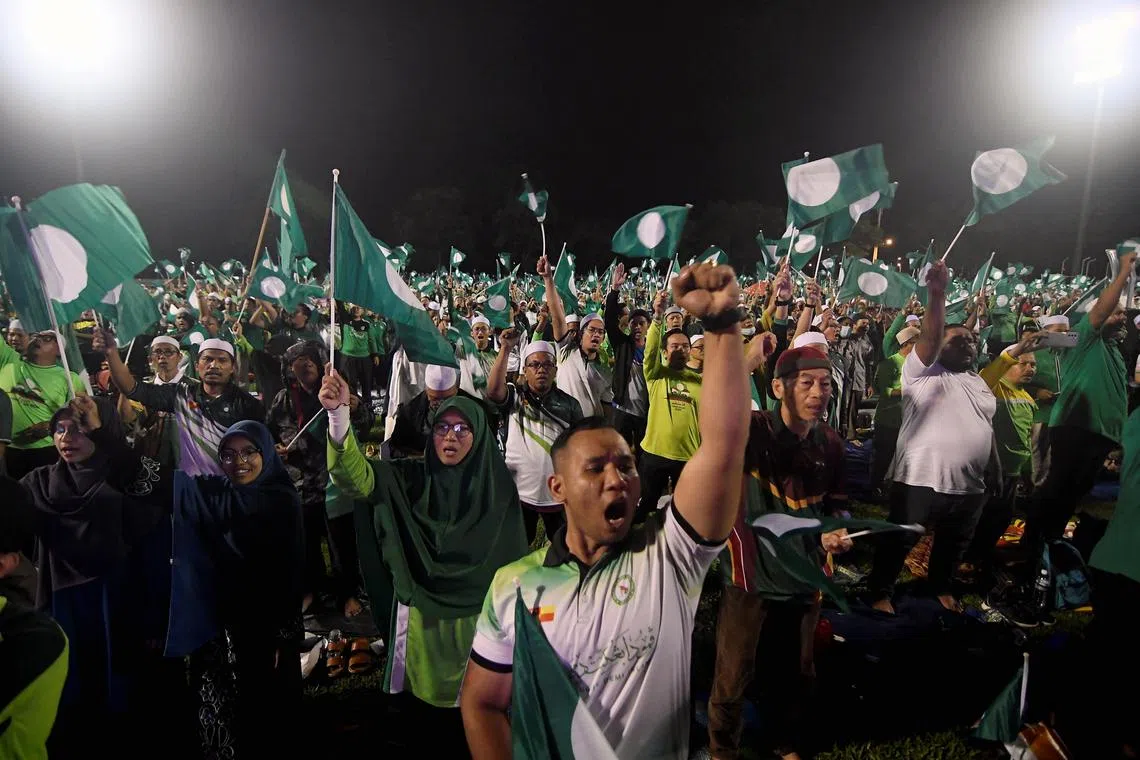Malaysian polls in November saw surge in hate speech on social media: Study
Sign up now: Get insights on the biggest stories in Malaysia

PAS representatives wave the party flag as they rally ahead of Malaysia's election.
PHOTO: BERNAMA
Follow topic:
KUALA LUMPUR – Hate speech surged during Malaysia’s bitterly contested general election
Although PAS is now in the opposition
“PAS president Hadi Awang and his party were the biggest amplifiers of race. Posts on race were also found to perpetuate disinformation,” said the report published by the Centre for Independent Journalism (CIJ) in partnership with Universiti Sains Malaysia, Universiti Malaysia Sabah and University of Nottingham Malaysia.
It cited as an example Tan Sri Hadi’s TikTok claim that the Chinese-dominated Democratic Action Party (DAP) from Prime Minister Anwar Ibrahim’s Pakatan Harapan (PH) alliance was “merely using Malay candidates to gain voter traction”, which saw 2.5 million engagements, the highest of close to 100,000 messages analysed.
The study tracked the Twitter, Facebook, YouTube and TikTok accounts of more than 90 key political and government actors.
It found that the number of “unique messages” touching on common hate speech subjects had nearly doubled to 99,563 from Oct 20 to Nov 26, compared with about 55,000 in a pilot study carried out over a longer period from Aug 16 to Sept 30.
Parliament was dissolved
The election threw up Malaysia’s first-ever hung Parliament, Datuk Seri Anwar was sworn in
But PN could further increase its support within the Malay-Muslim majority before polls to elect the governments of six of Malaysia’s 13 states.
CIJ executive director Wathshlah Naidu said at the launch of the Social Media Monitoring Of Malaysia’s 15th General Elections report on Tuesday that the weaponisation of race and religion is expected to continue at the state polls as the issue has gone largely unaddressed since the general election.
“For the state election... we are already foreseeing the possibility that it will be the same narrative because things have not really stopped,” she said.
The study found that Mr Hadi was the sole politician or influencer tracked with two posts reaching “level three” severity, deemed as containing dehumanising and hostile language.
The report, citing the lack of a universally agreed definition of hate speech, “adapted its own levels” to “address the progression of speech that is intolerant, discriminatory and dehumanising, and that incites violence and bodily harm”.
Over 80 per cent of hate speech messages analysed were of level one, indicating disagreements or non-offensive language, while close to 18 per cent were of level two for offensive or discriminatory language.
Only 105 posts were of level three and 39 were at the highest grade of severity, which involved incitement or calls for violence.
Some of these hate speech postings engaged in disinformation, such as when PAS leaders accused the DAP of being communists, while PN chief and former premier Muhyiddin Yassin claimed that Jews and Christians had a covert agenda to proselytise and convert Muslims in Malaysia.
About two-thirds of the posts analysed were race-based, followed by about a quarter that were religion-based, although many of the hate speech postings often had elements of both issues, or even other categories.
Some 14 per cent concerned the royalty, while posts touching on gender and targeting the LGBTIQ community accounted for about half of that. Less than 4 per cent of comments targeted migrants and refugees.


